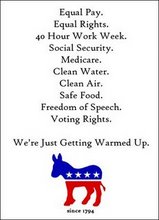Corporate Enemy No. 1: State Attorneys General
Washington Dispatch: As the Bush administration turns a blind eye to consumer crises, state AGs are picking up the slack—and making powerful enemies in the process.
By Stephanie Mencimer
December 6, 2007
(Excerpt from awesome Mother Jones) read it all
In return, corporate America has accused the attorney generals of abusing their power, usurping the role of state legislatures and Congress, and getting in bed with the plaintiffs' bar. The nation's biggest companies have been working on a new backlash. In late October, the U.S. Chamber of Commerce's Institute for Legal Reform (ILR) held its annual summit, and this year's program featured a special panel on reining in state attorney generals. The ILR rolled out what it called a state attorney general "code of conduct" that, if implemented, would prevent state attorneys general from bringing many of the successful suits they've initiated over the past several years. For instance, it would ban attorneys general from hiring outside lawyers on a contingency-fee basis.
Contingency fee arrangements have allowed the attorneys general to vastly expand their resources by hiring lawyers who get paid a percentage of anything they win in court, but who also get nothing if they lose. Big businesses believe that trial lawyers have inappropriately duped attorneys general into hiring them to bring potentially lucrative cases that the states would otherwise never initiate. They think the lawyers should get paid by the hour so their contracts would require legislative approval.
The code would also require attorneys general to return any lawsuit-settlement money to the general fund or other state agencies rather than invest it in further investigations or consumer-protection initiatives. Such a move would, for instance, wipe out West Virginia's anti-trust enforcement division, which is funded entirely with winnings from lawsuits. The ILR’s model code of conduct is based on a survey the Chamber conducted earlier this year on attorney general practices. Most of the attorneys general refused to participate in the survey, and probably rightly so, given that it's likely to end up being used against them in elections rather than to genuinely improve the quality of state representation.
Bob Cooper, a spokesman for Idaho attorney general Lawrence Wasden, who is the president of the National Association of Attorneys General, says that when the ILR sent out the survey, his boss called up the Chamber and said that if they had a problem with the way attorneys general were doing business, they should come out to Boise to talk to him. They never did, says Cooper. "Companies that follow the law don't have a problem [with attorney generals]," he says.
Nonetheless, with financing from many of the drug and insurance companies that have been the target of state investigations and enforcement actions, the Chamber and the ILR have made state attorneys general a major target of their lobbying and political campaigns. Along with the American Tort Reform Association and the American Legislative Exchange Council (both heavily funded by the tobacco industry), the ILR has pushed legislation in the states to prevent them from hiring trial lawyers. So far, only seven states have passed the Chamber's legislation, but it has had better luck in state election campaigns, in part because it has often employed illegal campaign tactics against candidates it’s seen as anti-business.
For instance, in 2004, the Chamber went after Democrat Deborah Senn, the former Washington state insurance commissioner who was running for attorney general. Using a dormant nonprofit called the Voter Education Committee, the ILR secretly dumped several million dollars into issue advocacy ads in Washington bashing Senn, who was comfortably ahead in the polls. Oddly enough, the ads accused her of being in the pocket of some of the very insurance companies that were funding the ads; polling data suggested that this would turn voters against her. The characterization wasn't true: Senn was a Naderite with a strong history of consumer protection. Nonetheless, she lost the election. The state's Supreme Court later ruled that the Chamber's ads were illegal because they failed to disclose who paid for them. "They spent $4 million in a race that should have been $750,000, at most," says Senn. "It was a devastating loss." (My added comment: at this point, the election for Attorney General should have been nullified, the reasoning laid out for the voters, and the offending ILR fined the amount required to hold a special election for this office. Regardless of the outcome, this action would discourage the type of election tampering that seems to be rampant in current times. Did I mention prison time for ILR officials?)
While, of late, the Chamber has been leading the charge against the attorneys general, it is by no means alone. In January, the Competitive Enterprise Institute issued a "study" on the nation's "Top Ten Worst State Attorneys General." CEI has been heavily funded by tobacco, auto, and utility companies and has been active in fighting off attempts to mitigate global warming.
Saturday, December 08, 2007
Subscribe to:
Post Comments (Atom)





1 comment:
Great post Rich. Fukken chamber of commerce is exactly THAT. This fallacy that "the business of America is business" is just BULLSHIT. The business of America is to make her CITIZENS comfortable, NOT her corporations. My heart is aching sore from all this pro business criminal activity that has gone on...
Post a Comment